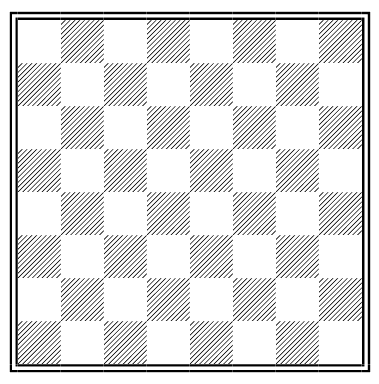Nothing is heavier than lead.
Feathers are heavier than nothing.
Therefore feathers are heavier than lead.
Nothing is heavier than lead.
Feathers are heavier than nothing.
Therefore feathers are heavier than lead.

From Henry Ernest Dudeney, Amusements in Mathematics (1917):
I have a single chessboard and a single set of chessmen. In how many different ways may the men be correctly set up for the beginning of a game? I find that most people slip at a particular point in making the calculation.
“Ignorance more frequently begets confidence than does knowledge.” — Charles Darwin
Born in 1804, Zerah Colburn was thought to be mentally retarded until the age of 7, when his father overheard him solving multiplication problems for other children and discovered he was a prodigy. From the 1872 autobiography of Amos Kendall, with whom he boarded briefly:
He could multiply together any two numbers under a hundred in less than a minute. He could tell, apparently without thought, how many days there are in any number of years less than thirty, and in any number over thirty and up to a hundred upon a minute’s reflection. After being told the denominations of weights and measures, he would reduce one to another with the greatest readiness. He answered correctly the question, ‘How many gills are there in three barrels?’ The question, ‘How many are 25 × 25 + 35 × 35 +45 × 45?’ he answered correctly with little hesitation. He readily multiplied any number over a hundred by any number less. In less than a minute he answered correctly the question, ‘How many days are there in seventy-three years?’
“What rendered his performances more wonderful was, that he did not know a figure when written, and could not count more than fifty. How he knew the names of larger numbers was a mystery, and he was sometimes embarrassed in making his answers understood. After he had stated correctly the number of days in a given number of years, he was asked how many hours there were. He said he did not know the number of hours in a day. On being told it was twenty-four he immediately gave a correct answer.”

A “snowball sentence” contrived by Dmitri Borgmann — each word is one letter longer than the last:
I do not know where family doctors acquired illegibly perplexing handwriting; nevertheless, extraordinary pharmaceutical intellectuality, counterbalancing indecipherability, transcendentalizes intercommunications’ incomprehensibleness.
Marcus Garvey suffered a stroke in January 1940, woke up to read his obituary in the Chicago Defender, learned that he had been “broke, alone and unpopular,” suffered a second stroke, and died.
Lord Monboddo relates the following anecdote of a serpent: ‘I am well informed of a tame serpent in the East Indies, which belonged to the late Dr. Vigot, once kept by him in the suburbs of Madras. This serpent was taken by the French when they invested Madras, and was carried to Pondicherry in a close carriage. But from thence he found his way back to his old quarters, though Madras was above one hundred miles distant from Pondicherry.’
— Frank H. Stauffer, The Queer, the Quaint and the Quizzical, 1882

One candidate for the world’s shortest play is The Exile, by Tristan Bernard.
The curtain rises on a mountaineer in a remote cabin. An exile knocks on the door.
EXILE: Whoever you are, have pity on a hunted man. There is a price on my head.
MOUNTAINEER: How much?
The curtain falls.
But shorter still may be Samuel Beckett’s 1969 play Breath, which lasts 35 seconds. As we view a bare, litter-strewn stage, we hear a baby’s cry, a person inhaling once and then exhaling, and then another cry. At the play’s West End debut, one audience member said, “I just want to put on record that I thought the whole evening was completely bogus and pretentious.”
(Thanks, Adam.)
“It is not impossible that in a real dream of sleep, some one may have created an antagonist who beat him in an argument to prove that he was awake.”
— Augustus De Morgan, Formal Logic, 1847
On March 14, 1887, Rhode Island evangelist Ansel Bourne woke up in an unfamiliar room. To his astonishment, he found that he was in Norristown, Pa., where he had been running a stationery and confectioner’s shop for two months, calling himself A.J. Brown.
His nephew helped him return to Providence, where psychologists diagnosed a case of dissociative fugue, multiple personality, and amnesia.
Inspired, Robert Ludlum borrowed the preacher’s surname for his novel The Bourne Identity.